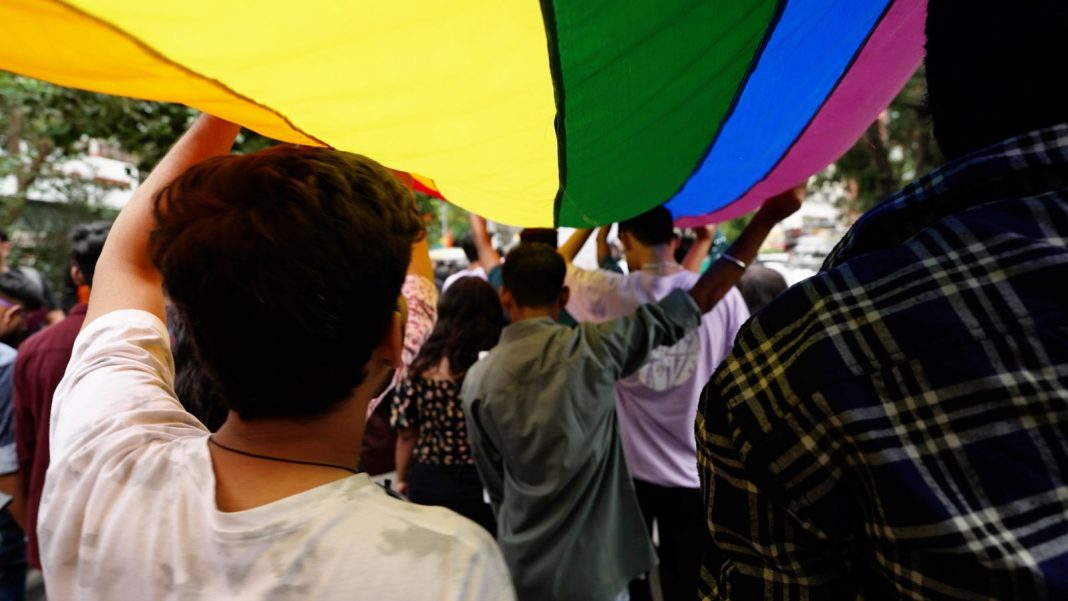Widely discredited around the world, conversion therapy – which aims to change someone’s sexual orientation – is still legal in India but the practice of it by doctors is banned.
Above a second-hand car shop on a bustling Delhi street, sits the office of the Indian capital’s self-proclaimed “best sexologist”.
Dr Shriyans Jain is smartly dressed in a crisp white shirt and black waistcoat with a jet black moustache adorning his upper lip. His thick, dark hair is swept across his forehead. I’m going undercover to investigate claims he offers gay and lesbian people a cure for their sexuality.
He is trained in modern medicine (MBBS qualified) but also practises ayurvedic medicine (a traditional type of Indian medical system). He’s also registered with the Delhi Medical Council. His website proudly trumpets his credentials, and lists several of the conditions he treats with herbal medicine. They include premature ejaculation, erectile dysfunction and even infertility. But the service he offers gay and lesbian patients doesn’t appear to be advertised.
Dr Shriyans Jain
Widely discredited around the world, conversion therapy – which aims to change someone’s sexual orientation – is still legal in India – just as it is in the UK. It can involve the use of medication, treatments like electric shock therapy and even violence.
Practising it is considered “medical misconduct” in India after a ruling by the Indian Medical Commission in 2022, the industry’s regulatory body. It wrote to all the State Medical Councils empowering them to take disciplinary action against any medical practitioners who undertake it. In some cases, they could lose their licences.
Posing as a gay woman enquiring about whether I could change my sexuality, I arrive at Dr Jain’s office. The waiting room walls are lined with framed pictures of him with various dignitaries and awards. Inside, the blinds are drawn and a security camera nestles in the corner. Above his desk, hangs an imposing metal sculpture of seven horses pulling the sun.
I sit down and, to my surprise, it’s mere minutes before Dr Jain tells me about his “lifelong cure” that will make me straight by altering my hormonal balance and “mental activity”. The treatment will take a maximum of three months and is totally safe, he assures me.
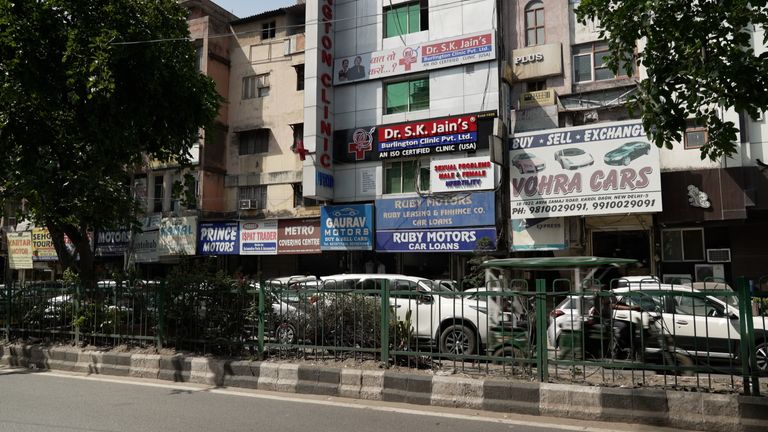
The entrance to Dr Jain’s facility
How can he be so sure it will work?
“You have to trust your doctor,” he says, smiling benevolently. He says he’s treated countless numbers of gay and lesbian patients. While he can’t recall the exact figure he seems confident of success. Some patients feel the effects in 15 days, he adds. “You get a change in your body. Your curiosity will develop.”
A low immune system and poor dietary habits such as eating meat are possibly the cause of my sexuality, says Dr Jain. He moves his head from side to side as if he’s pondering a host of potential causes.
“So meat can make you gay?” I ask, incredulously.
“You have to take precautions for it,” he replies.
A medical exam is carried out. Then, I am directed to stand on a vibration machine in the waiting room for about 10 minutes – it looks like the ones used for muscle strengthening and weight loss. A big plate pulses beneath my feet. I struggle to keep my balance as my body jiggles around.
Finally, a member of Dr Jain’s team hands me three tubes of pills and instructs me to take them daily. The medication costs around £150 in total. I’m told they’re herbal but beyond that I don’t know what is in them.
Keep in touch via video call, Dr Jain, says if I have any more questions or want to order more medication online. He seems proud the pills are manufactured in-house.
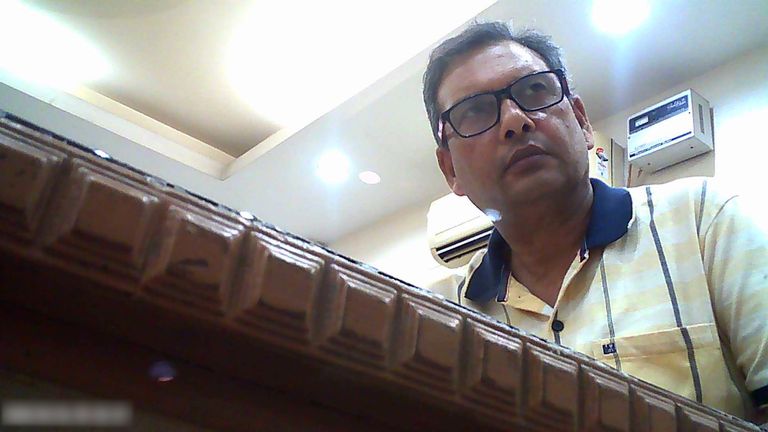
Dr SP Singh, a homoeopathic doctor at the Dr Dilbag Clinic
Read more:
India could legalise same-sex marriage
Protests rock Indian parliament after ethnic violence in Manipur
Dr Jain is not alone in offering a ‘cure’ for sexual orientation. Elsewhere in Delhi, my colleague, posing as a gay man, meets Dr SP Singh, a homoeopathic doctor at the Dr Dilbag Clinic. The atmosphere is more relaxed here, and the doctor is casually dressed in a white and yellow striped polo shirt.
During the consultation, he claims to have cured more than 500 lesbian and gay people. Being gay is a “psychological” disease, he says, but his treatment will make you “normal” within four months.
“The problem is the way you think,” says Dr Singh. “And with the medicines the problem will be solved.” Like Dr Jain, Dr Singh claims there would be no side effects.
When Sky News contacted both doctors for comment, they denied any wrongdoing. There are likely many other doctors offering a similar service, who don’t see any issue with it, despite the guidance by the NMC. They both seem convinced of their own theories and remedies.
The NMC covers modern medicine and those breaching the rules are potentially crossing a wide range of legal and ethical issues while trying to cure homosexuality. While other systems may subscribe to their regulations, the vast array of alternative medicine in India is often monitored and regulated differently.
There is a range of different conversion therapy techniques. Certain people may argue particular therapies are more harmful than others and distinguish between those they deem “consensual”.
Currently, 25 countries have some form of ban on conversion therapy- some explicit legislative bans, some indirect.
The fact is this isn’t an Indian problem. Far from it. But our time in the country has shown us there is a clear demand for the service that persists, illustrating the societal pressures inherent in this largely rural, and deeply traditional, nation.
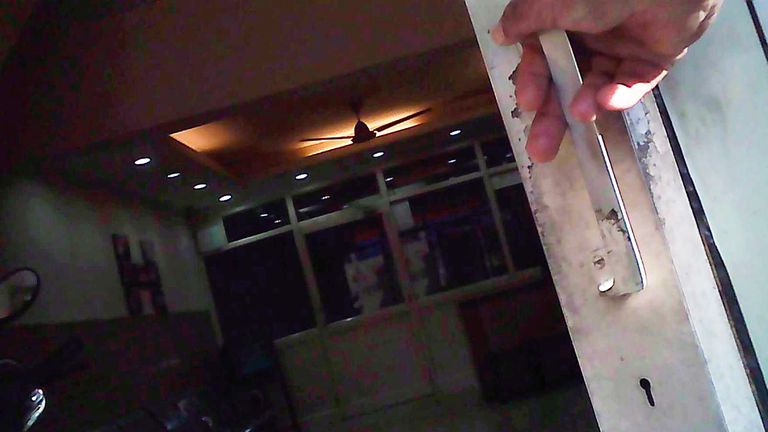
The entrance to Dr Singh’s clinic
According to activists, there are a huge number of desperate individuals and families privately seeking sexuality cures from doctors.
Many patients, and perhaps health professionals, still don’t know about the regulation that was brought in to try to stop conversion therapy. But in many ways, India has gone further than other countries in trying to stop the practice. LGBTQIA+ campaigners in the UK say Britain has been too slow to bring in a ban.
There is also that chance that India, where homosexuality was only legalised five years ago, could be about to become only the second country in Asia to legalise same-sex marriage. At a rally in Pune in western India, hundreds of LGBTQIA+ activists make their voices heard, ahead of the Supreme Court’s vote on the issue.
The reality is many still don’t feel accepted, especially those living in rural communities. “We feel less human, less included and less part of society,” a protestor wearing large sunglasses and bright red lipstick tells me.
“I’m gay, that’s ok. I’m lesbian, that’s ok,” the crowd chants as it processes through the streets. People of all ages hold aloft handmade signs, Pride flags and rainbow umbrellas.
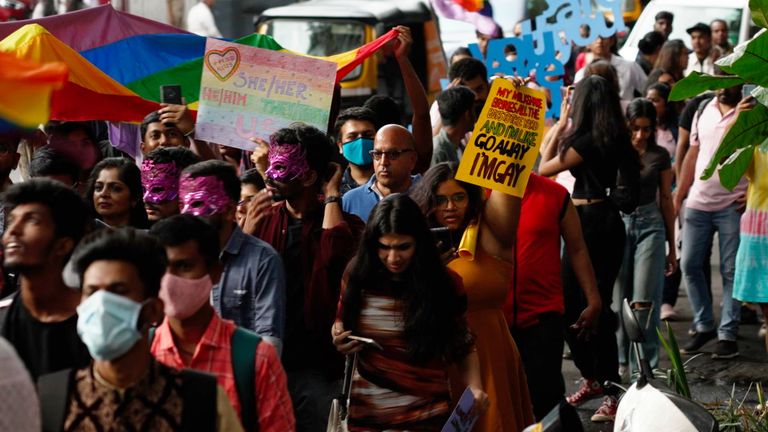
Could gay marriage be legalised in India?
Police stride slowly alongside keeping a watch on this peaceful gathering. Their message is simple – they want acceptance and to enjoy basic rights such as being able to buy a house with their partner and adopt a child.
“My family tried to cure me of my sexuality,” says Sonia Singhal, 38, an activist who says that when she came out as a lesbian to her late father, he took her to see a priest who told her she’d been invaded by a male spirit.
Now, two decades later, she is overcome with emotion when contemplating the difference that legalising same-sex marriage might have in her homeland. “I can’t express it,” she says, tearfully. “There is a generation coming behind us. At least we can do something for them.”
India is a place of paradox. The opposition of the religious bodies and the government to gay marriage makes legalisation in this instance unlikely. And when it comes to conversion therapy, activists claim the regulatory body is too weak to take meaningful action against those who persist in profiting from it.
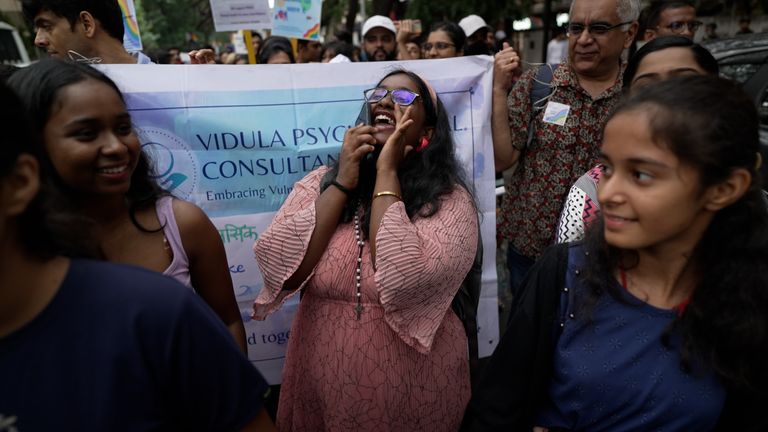
gay conversion narrate
Human rights activist Anjali Goplan, complained to the Delhi Medical Council about alleged conversion cases more than five years ago. Two doctors were temporarily suspended. “It seems like the medical profession is out of the reach of the law,” she says. “Everyone is doing whatever they want.”
In her view, the doctors who practise this “should be barred for the rest of their lives from playing with somebody’s life like that”.
But there are a lot of practitioners to monitor in this vast country, lots of different types of medicine and lot of secrecy in communities to counteract. Without it being criminalised, it’s hard to see how it will ever truly end.


